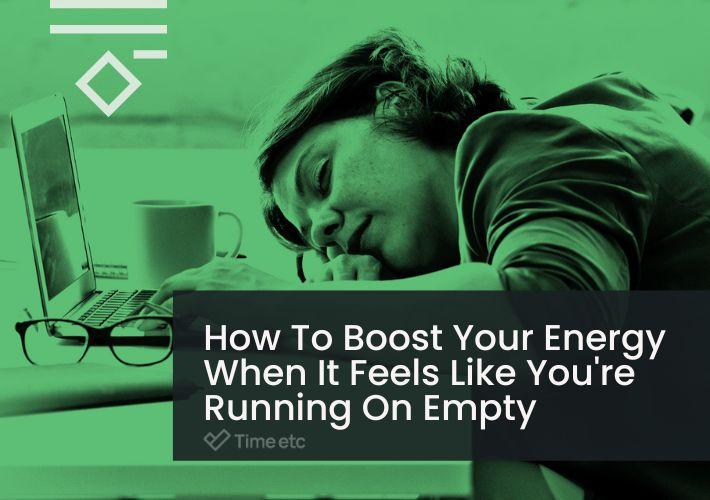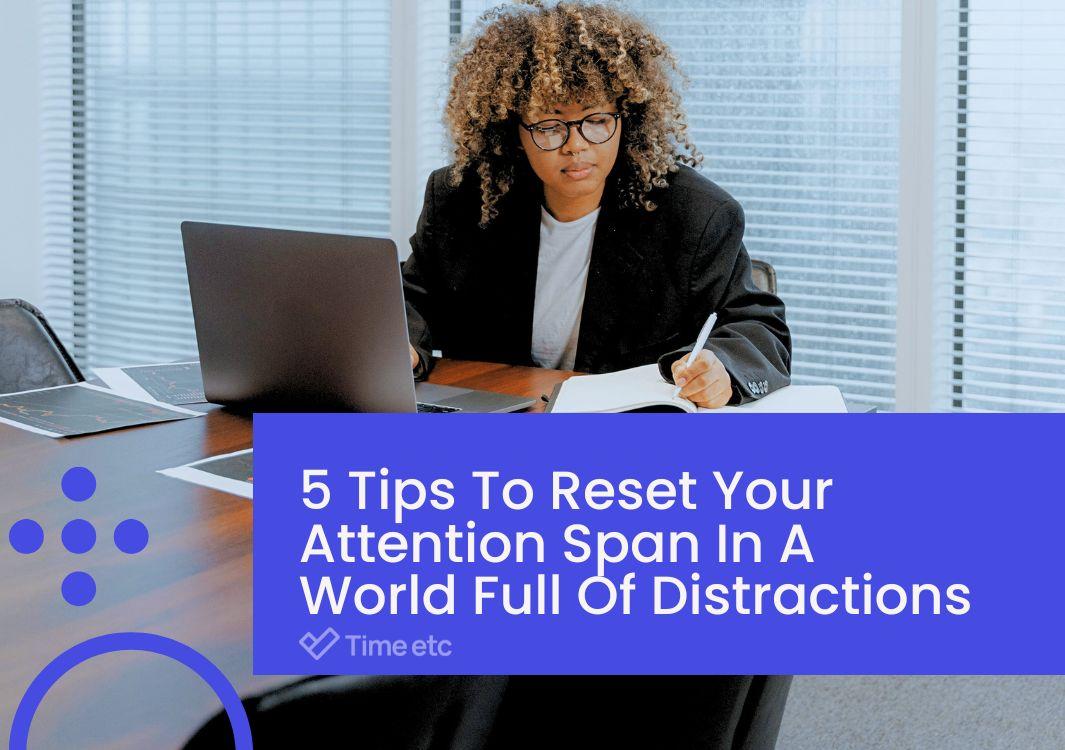Entrepreneurs are known for their go-getter attitude and boundless energy. But even the most driven person can get worn out occasionally.
We've all had those days (or even weeks) where we just can't seem to get going, and it can seriously take its toll–both physically and mentally.
You may be low on energy for a number of reasons, but one thing is certain: Even though you're tired, you still have work to do! But how can you expect to accomplish anything when you’re fighting a constant battle to stay awake?
Why we should avoid being tired at work
Many entrepreneurs feel like being constantly tired comes with the territory of being a business owner. Burning the candle at both ends and working around the clock is simply part of the job description.
In the short-term, tiredness can improve your focus for a short while if you’re working on one task at a time. This is because you’re lacking energy, and your brain can’t afford to waste any getting distracted. But this shouldn’t justify tiredness being the norm for entrepreneurs. Even if you’re used to feeling like you’re running on fumes all the time and you feel like you can handle it, this habit can actually be detrimental to your business in the long run.
In terms of our effectiveness at work, lack of sleep leads to lower alertness and concentration, as well as impaired judgment, memory, and learning. Not only that, lack of sleep can significantly affect your mood and reduce your ability to cope with stress.
According to one recent survey exploring the impact of tiredness and fatigue on workplace performance, 37% of respondents reported being more forgetful and prone to errors when they are tired, 30% admitted to being short-tempered with colleagues, 30% had had an accident, made a serious mistake, or felt exceptionally stressed at work as a result of extreme tiredness, and 20% admitted to falling asleep while working.
It’s clear that feeling tired at work can affect your productivity, your mood, and how you work with others. Many of us find that once we start to feel tired during the day, the negative effects can start snowballing. So here’s what you need to know about why it can happen and, more importantly, how you can beat it.
“Fall fatigue”
Now that the days are shorter and the weather is colder, many of us start to feel like hibernating. Why is it so much harder to get out of bed in the morning now than it was in summer?
It turns out there are a few scientific reasons for this.
We all have an internal clock, known as circadian rhythm, that tells us when to be awake and when to sleep. This is usually regulated by the light of the sun. When it’s dark, our bodies produce more of the sleep hormone melatonin. So less sunlight and longer nights in fall and winter lead to increased feelings of tiredness.
Step outside
Being an entrepreneur often means spending a lot of time indoors, either in the office or working from home. We all know that spending too much time indoors can make us feel a bit stir-crazy, but one of the best ways to help you get through the day–especially in the fall and winter–is to get some direct exposure to light. Natural sunlight boosts serotonin levels in the brain, which gives you more energy and help keep you calm, positive, and focused.
If we spend all our time inside, all we get is artificial light. This can leave us feeling drained and out of sorts.
So whether it’s enjoying your morning coffee out in your backyard or taking a short walk at lunchtime, the daylight will help maintain your internal clock and delay the release of melatonin in your body.
Rise with the sun(clock!)
A sunrise alarm clock, or dawn simulation light, is usually a standard digital clock that mimics the steadily increasing light of sunrise, instead of emitting a noise.
While it may not be quite the same as waking up to a glorious summer morning, it could well be the next best thing for regulating your circadian rhythm and helping you feel more awake in the mornings. Not only that, experts believe sunrise alarm clocks help you wake more gently and more naturally than a traditional alarm, and can reduce sleep inertia – the feeling of grogginess and disorientation when you first wake up – and even reduce the risk of heart attacks!
Stick to your regular sleep schedule
There's nothing quite like the feeling of finally getting horizontal at the end of a long day battling to keep your eyes open. But as tempting as a quick afternoon snooze or a sleep-in the next morning may be, this could actually do more to keep us tired in the days that follow, rather than re-energize us. And thus, a vicious cycle is born.
Maintaining a consistent sleep schedule is one of the best ways to keep your internal clock regulated. Going to bed and waking up at the same time each day (or as close as possible!) trains your body to feel sleepy when it should, and awake and alert when it should.
Lack of Vitamin D
The changing of the seasons can mean we might miss out on another vital benefit from the sun’s light. Vitamin D is essential for many aspects of our health–including strong bones, teeth, muscles, and immune function, and our bodies make it when our skin is exposed to sunlight.
As you can probably guess, it’s much easier for us to get good levels of Vitamin D in the summer. Depending on your location, fall and winter weather could mean your body has no new opportunities to produce Vitamin D for nearly six months! And according to experts, tiredness and fatigue are the most common signs that our levels are running low.
Step outside… again!
Even in the summer when the sun’s rays are much more abundant, our bodies cannot make Vitamin D from light that comes through a window. So this is another reason why it’s even more important to spend time outdoors if you can.
Vitamin D-iet
When getting outside is easier said than done (or downright impossible!), there are some alternatives. Very few foods naturally contain vitamin D, but luckily, you’ll find the ones that do in any grocery store or supermarket.
Oily fish such as salmon, mackerel, and tuna are said to be the best natural sources, with egg yolks, red meat, liver, and cheese containing lesser amounts. Vitamin D is often added to milk (both dairy and plant-based alternatives), breakfast cereals, and juices.
Supplements
Aside from the sun’s rays, supplements are the best way of maintaining vitamin D levels in the colder seasons. The two types that are available in supplement form are vitamin D2 and D3. Either will do the job, but many believe D3 to be the best option as it is thought to more closely resemble what is naturally produced by the body, and keep your levels higher for longer.
Because vitamin D is fat-soluble, experts say it is best absorbed when taken with a meal or snack that includes some fat.
Diet
Do you ever find yourself forgetting to eat in the middle of a busy day? Have you ever been “too busy” to fix a proper meal for yourself and settled for a sugar-filled snack to tide you over? Do you ever skip breakfast to ensure your kids are ready for school on time?
While I’m sure this won’t be groundbreaking news, how, when, and what we eat plays a hugely significant role in our energy levels. After all, it is the fuel that keeps us going. If you were about to set off on a road trip with no gas in your tank, how far do you think you would make it toward your destination?
Say “yes” to snacks
It’s a well-known fact that focusing on work is ten times harder when you’ve got no energy. What’s not so well-known is the reason behind this.
Research has shown that self-control and willpower are closely linked to the level of glucose, or blood sugar, in our bodies. As well as regulating energy levels, blood glucose is a major energy source for self-control, such as controlling attention, regulating emotions, and coping with stress. You need relatively large amounts of blood glucose to perform these actions well, so when levels are low, that’s when we’re more likely to slip up. Hello, afternoon slump!
Healthy snacks will keep you more energized and alert throughout the day, and prevent your blood sugar from dropping in the gaps between meals. But if you find yourself in a mid-day slump with zero motivation to focus on work, simply restoring glucose levels is usually enough to improve self-control, so grabbing some fruit, nuts, seeds, an oat bar, or a protein bar will help to keep you on track.
Grab a glass of water
We all know that our body needs fluids to function properly, but did you know that one of the first signs of lacking proper hydration is feeling tired or sluggish? (I didn’t!)
Many of our bodily functions are regulated by fluid balance, and even slight changes in this balance can have an impact on our daily lives and performance. This is because water is the main component of blood, which is responsible for carrying nutrients to our cells and taking away waste products. When fluids are not replaced, blood volume can drop, causing the heart to work harder in order to supply oxygen and nutrients around the body.
There are a lot of different drinks out there that claim to be the best for hydration and energy. Some people swear by isotonic sports drinks to help them get through the day, and although the added vitamins, minerals, and electrolytes may help to regulate certain body processes, experts say these won't do much for your energy levels if you’re drinking them outside of a workout. So when in doubt, a simple glass of water could be all you need.
Underlying medical issues
There are many potential reasons why we could be feeling particularly tired. However, it’s important to be aware of when tiredness turns into fatigue. Tiredness is more short-term than fatigue, and we’ll usually feel better after some adjustments to our routine that give us more consistent and regular sleep. But if that doesn’t work, this may be a sign of an underlying health problem.
Anemia, thyroid problems, fibromyalgia, kidney disease, and chronic fatigue syndrome are just a few of the conditions known to cause fatigue, so if you’re always feeling exhausted no matter what you do, it’s worth making an appointment at the doctor’s office.
What’s the bottom line?
When you’re tired, it makes everything just that much harder. And even the best of us don’t have unlimited reserves of energy to be at their best 100% of the time. That’s why it’s important to understand what causes these feelings of tiredness and low energy, and what we can do about them.
There is no one-size-fits-all solution to help us better, but by trying out different strategies one at a time, you can figure out what works best for you.







